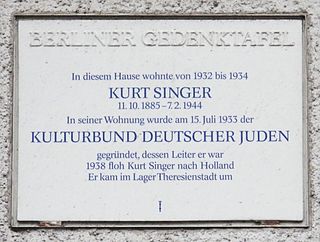Related Research Articles
Stefan Wolpe was a German composer. He escaped to Vienna separating from his wife and daughter. He married in Vienna in 1927 and again in 1934. Wolpe went to Palestine and moved in 1938 to the USA where he married for a third time.
Ernst Heinrich Krenek was an Austrian, later American, composer of Czech origin. He explored atonality and other modern styles and wrote a number of books, including Music Here and Now (1939), a study of Johannes Ockeghem (1953), and Horizons Circled: Reflections on my Music (1974). Krenek wrote two pieces using the pseudonym Thornton Winsloe.

Eduard Steuermann was an Austrian pianist and composer.

Hildegard Zadek was a German operatic soprano. She was Kammersängerin at the Vienna State Opera and performed internationally.

Sybil Bianca Giuliett Eysenck is a personality psychologist and the widow of the personality psychologist Hans Eysenck, with whom she collaborated.

Ernst Roth was a music publisher for Universal Edition in Vienna and Boosey & Hawkes in London, and became the company's director in 1968. He also wrote about music and translated.
Israel Alter was an Austrian-Hungarian Jewish cantor and last chief cantor in Hanover, Germany. The well traveled composer was regarded as "the one Chasanim, the cantor of the cantors".
Katja Andy was a German-American classical pianist and piano professor.

IRMA WOLPE RADEMACHER, née Schoenberg, was a Romanian-born American pianist and teacher.
Günter Discher was a swing music lover and gramophone record-collector, and was called "the oldest jazz-DJ in Germany".
Karl Klingler was a German violinist, concertmaster, composer, music teacher and lecturer.

Henri Hinrichsen was a German music publisher and patron of music in Leipzig. He directed the music publishing house C. F. Peters, succeeding his uncle. He helped found the Hochschule für Frauen zu Leipzig, the first academy for women in Germany, and financed the acquisition of a collection of musical instruments by the University of Leipzig. He was murdered at the Auschwitz concentration camp.
Eugenie Sendrey also Eugenie Szendrei, Eugenie Weisz and Eugenie Wilms, was an American soprano of Austrian-Hungarian origin who worked under her birth name Eugenie Weisz at the Vienna State Opera under Gustav Mahler. Sendrey was the wife of the composer, conductor and musicologist Alfred Szendrei and the mother of the composer and arranger Albert Richard Sendrey. One of her siblings was the violinist, conductor and composer Paul Weiss.
Heinrich Lutter was a German pianist and piano educator.
Jean-Siegfried Blumann was a German conductor and composer.
Peter Petersen is a German musicologist.

Moritz Mayer-Mahr was a German pianist and music educator.
Wilhelm Fischer was an Austrian musicologist.
Maurits Frank was a Dutch cellist and music educator.

Kurt Singer was a German neurologist, musicologist and chairman of the Jüdischer Kulturbund.
References
- ↑ Lexikon exiled musicians of the Nazi era. retrieved 15 November 2020
- ↑ Lexikon verfolgter Musiker und Musikerinnen der NS-Zeit on digiversity.de of 14 December 2009
- ↑ Sophie Fetthauer: Biographical Dictionary of Persecuted Musicians 1933–1945. Article on the website of The Orel Foundation (englisch)
- ↑ Dokumenten-Management am RRZ Hamburg, retrieved 15 November 2020